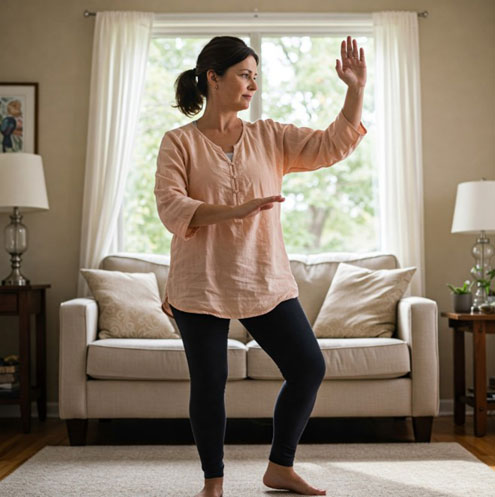Whitewright, Texas Tens of millions of Americans serve as unpaid caregivers to family members and friends. Within our communities here in Grayson County, caregivers know that finding time for self-care often seems impossible. They know they should take care of themselves, but who has time for that when someone else needs them constantly?
And yet, in my 35 years of martial arts practice, I've seen how physical disciplines can transform lives. In particular, many caregivers who discover Tai Chi have transformed their own energy and well being. Tai Chi helps them build moments of what I call "Caregiver Minutes" simple movements that deliver maximum benefit in minimal time.

What Happens to Caregivers' Bodies
Many caregivers show what medical professionals call "caregiver posture" rounded shoulders, tight neck muscles, and lower back strain from physically assisting others. Most report disrupted sleep and persistent anxiety. Ive seen caregivers who have trouble focusing because all they can do is concentrate on the needs of the person they are caring for.
This isn't just my observation. Research from the National Alliance for Caregiving in 2009 shows that 23% of family caregivers report deteriorating health due to caregiving responsibilities.[1] What makes Tai Chi uniquely beneficial for caregivers is how it addresses both physical tension and mental stress. The gentle flowing movements create a moving meditation that activates the body's natural relaxation response.[2] Unlike high-intensity exercises that can further tax an already exhausted caregiver, Tai Chi's gentle approach actually restores energy while building core strength.
Five-Minute Practices Anyone Can Do
I have adult students who care for their parents. They are often skeptical that brief Tai Chi sessions could make any difference in their exhausting routines.
So, I start them with just one move that takes 90 seconds. I tell them, "Practice whenever you have a moment waiting for water to boil, waiting on hold for a medical insurance call, or just before bed." If possible, they might be able to include their parents, creating a sort of "daily five minutes of peace."
For my caregiver students, I recommend these three foundational practices that require minimal space and can be done in regular clothing:
1. Mindful Breathing with Arm Circles
Stand with feet shoulder-width apart. Inhale slowly while raising arms upward and around in a circle, exhale while lowering them. Go slowly: three seconds up, and three seconds down. Focus entirely on the sensation of breathing and moving for 60 seconds.
In the Yang and Qi Gong styles of Tai Chi that I practice, we emphasize how breath becomes a bridge between mind and body. For caregivers constantly attending to others' needs, this simple practice creates a moment of self-awareness.
2. Weight Shifting
From the same standing position, slowly shift weight from one foot to the other, being careful to keep both feet planted. This gentle rocking motion releases lower back tension while improving balance crucial for caregivers who assist with transfers.
This can be particularly helpful for my students who help relatives in and out of chairs or beds. The improved balance and core strength make these movements safer for both caregiver and care recipient.
3. Neck and Shoulder Release
Sitting or standing, place hands on shoulders and make gentle backward circles. This relieves the tension that accumulates from helping others sit up, stand, or move.
When I first began studying Tai Chi, I was amazed at how such simple movements could release tension I didn't even realize I was carrying. For caregivers, this tension release can be the difference between restful sleep and another night of tossing and turning.
Tai Chi can evolve from a personal survival strategy into a family activity. Students can practice modified movements alongside those they care for. Whole families can participate in chair-based movements together.
Unexpected Benefits of Tai Chi
Tai Chi can create unexpected benefits. The Mayo Clinic notes that benefits may include decreased stress, anxiety and depression.[3] Within my experience with students, I've seen tremors decrease, anxiety lessen, and sleep improve.
These small practices can make a significant difference: decreased back pain, better sleep, and most importantly, more patience with loved ones. If you're caring for a loved one and feeling the physical and emotional toll, I invite you to join us. We offer a free first lesson. Regular Tai Chi classes run Monday, Tuesday and Thursday at 2 p.m. at our center, located at 108 W. Grand in Whitewright. For more information, call or text (903) 227-6023 or visit whitewrightmartialarts.com.
References
[1] "Caregiver Statistics," Caregiver Action, https://www.caregiveraction.org/caregiver-statistics/
[2] "This ancient martial art can fight disease, calm the mind and slow aging," Harvard Medical School, https://hms.harvard.edu/news/ancient-martial-art-can-fight-disease-calm-mind-slow-aging
[3] "Mayo Mindfulness: Tai chi is a gentle way to fight stress," Mayo Clinic, https://newsnetwork.mayoclinic.org/discussion/mayo-mindfulness-tai-chi-is-a-gentle-way-to-fight-stress/

